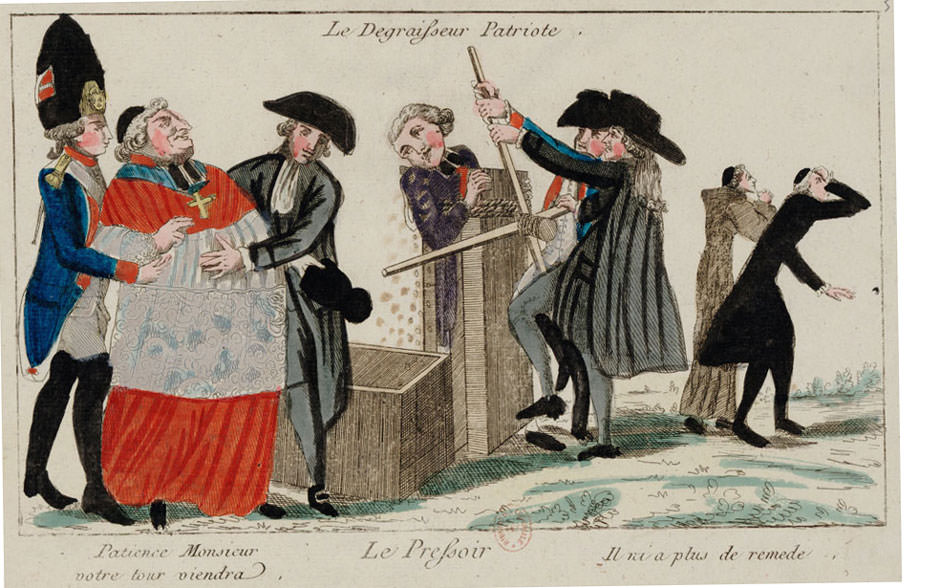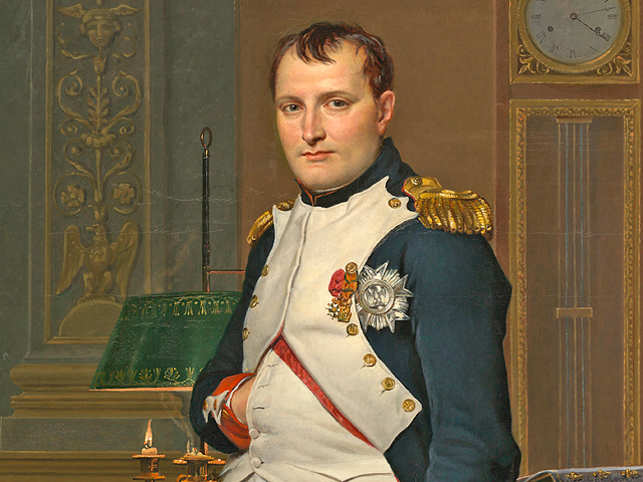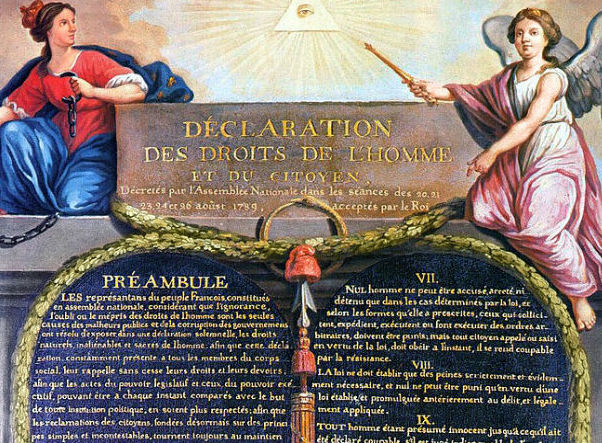The anniversary of the French Revolution on July 14th has not been commemorated as a major event for quite some time, whether in presence or absence of a world pandemic. Today’s researchers are not reticent about criticizing the work of Robespierre and his contemporaries and yet France continues to celebrate the event with typical triumphalist narratives and oppressive rhetoric.
The scent of victory for the democracy that historians have ever since enjoyed filling the air with is not so much to cover the stink of death that emanates from the Revolution’s massacres – a “collateral damage “of which democracy has never been ashamed – but to cover the stench of lies. The Revolution was ever a lie, that is why an enthusiastic cult of 1789 has been retained ever since.
The Revolution lied from the very beginning when it proclaimed it was the reaction of a population suffocated by absolutism. In reality, history reveals that Louis XVI’s tenure was the antithesis of tyranny, beginning with the King’s kindness as a man.
Louis Capet abolished torture in the criminal system and was planning to abolish feudal privileges as well. Historians believe that when Louis XVI was guillotined, he had no faults except that he was a symbol of a world that the Revolution wanted to destroy: his execution had to be, and was, a rite of passage.

“The Patriotic De-Fattening Machine,” a cartoon from the French Revolution, circa 1790.
The second institutional lie after “tyranny” was the assertion that the Revolution had been both spontaneous and popular when in fact it had been an intellectual project theorized and brought into operation by “others”.
Of course, a part of the French people did take up arms against the monarchy. But it is also true that the Fathers of the Enlightenment – the “others” – had flooded prerevolutionary France with anti-monarchical and anti-Christian propaganda for half a century.
THE ASSEMBLY OF THE REVOLUTION
The power that hammering media information has to inculcate “strange thoughts” into the collective consciousness is clear to everybody to see during the present declared pandemic. Just imagine how valuable this type of communication had been in the eighteenth century public opinion!
Pius XII noted in the radio message of Christmas 1944:
“People and amorphous multitude (or ‘the mass’) are two different concepts. The people live (…) the mass is inert and can only be moved from the outside (…) easy amusement in the hands of anyone who exploits its instincts or impressions, ready to follow, from time to time, today this, tomorrow that other flag “.
People have a sense of self-identity that is based on their history and traditions. If a people suppresses its spirit, it becomes a “mass” bereft of culture and ideas; two elements which the “others” have consistently provided from that moment on. The “others” in this instance are the Fathers of the Enlightenment, or Philosophers as they identified them in prerevolutionary France, whose beliefs corroded the French people’s Catholic identity like acid.
The Philosophers had been spreading their ideas for over thirty years – wrote the English ambassador Horace Walpole, Chancellor of the Exchequer (1) – after a trip to Paris in 1765 :
“Good humor is as out of fashion as the game of puppets or that of the little man always upright. These good people no longer find the time to be happy, they have too much to do: they must dethrone God and the King. Individually and collectively, men and women have committed themselves to this demolition work “
THE SCENARIO
The leader of the Enlightenment, Voltaire, said: “Quand la populace se mêle de raisonner, tout est perdu”. (Correspondence, April 1, 1776)

“When the population begins to reason, all is lost”
Voltaire, Montesquieu, Diderot, Condorcet, d’Alambert, d’Holbach, Helvetius, and other Philosophers were not “oppressed” men. Those aristocrats and wealthy bourgeois molded the collective consciousness through books, pamphlets, magazines, associations, and clubs, continually spreading subversive ideas that educated French public opinion in contempt for their French national institutions and admiration for English ones. They preached an atheistic and materialistic philosophy with a passion that moved to the hatred of Catholicism and never touched the concept of Democracy.
There is nothing unusual about that. What it is shameful however is the double life of both the Fathers of the Enlightenment and their revolutionary disciples like Sieyes, Mirabeau, Demoulins, Danton, Marat, Robespierre, Saint Just and others. They were all affiliated with the Order of the Freemasons. All, without exception.
As a result, the so-called “free thinking” of the eighteenth century looks to be anything but free, as it was entangled with the objectives of a secret organization, skilled in manipulating individual and collective consciences, and master of revolutions.
A century after the storming of the Bastille, a Lodge Master recorded in the most authoritative Masonic paper in France of the age: “Yes, we are revolutionaries, because we not only walk with the revolution, but we push the peoples into it” (2).
Masonic revolutions, on the other hand, never deliver on their promises. “Freedom, Equality, and Fraternity” proved to be an effective ideology for inflaming minds, despite the facts point in a contrary direction.
A retroactive review of the events reveals that the Revolution’s leaders planned the elimination of Christian civilization rather than the abolition of feudal privileges.
A few years after the Bastille, the French – still stained with the blood of Louis XVI – acclaimed Napoleon as Emperor and his Court as the new aristocracy.
After crushing the Guilds and Trade Associations (Le Chapelier law, passed by the Convention on June 14, 1791) of the Ancien Regime, the revolutionaries handed the workers over to the newly created industrial capitalism, the New Regime which essentially murdered them.
France, which at the cost of massacres had ceased to be a monarchy and become a Republic, in the the aftermath of the Revolution awoke none other than to the Imperialism of Napoleon, voluntarily subjecting itself to a man who believed to be a semi-god, holder of power without bounds.

All of this was accomplished with the aid of the same Freemasonry that had prepared the Revolution in the name of the war against “privileges”!
For the Freemason historian Ernesto Nys (3):
“The Empire was a period of true prosperity for Freemasonry. The Grand Orient ended up having 826 lodges and 337 chapters to its obedience, and the names of the people who composed them clearly show the importance that the institution had acquired. In 1807, Joseph King of Naples and Sicily, grand elector of the Empire, was a Grand Master; Prince Cambareces and Prince Murat were adjunct Grand Masters. Among the great dignitaries were the marshals Kellerman, Massena, Lannes, Angereau”.
As a result, while the form of power in France did not change after the Revolution, the nature of power did. The established New Order was no longer Christian. Freemasonry had won.
“Totalitarian anti-Christianity is the only true essence of the French Revolution and its only true project from start to finish.” (4)
NOTES ON FREEMASONRY
The Grand Lodge of London was founded on June 24, 1717, thus marking the start of contemporary Freemasonry.
Since the beginning of the 13th century, the term Freemasonry – derived from the French maçon and the English mason -has been applied to define the Guilds of stone-cutters and masons who – working under the supervision of a master architect -invented the Gothic style. This was a type of architecture that could be found in cathedrals all over Europe, from Scandinavia to Spain.
At its peak, the Masonic Guilds were the custodians of Catholic Art and Culture.
Modern Freemasons conceptualized the development of a New World Order by confiscating the rhetoric and symbolism of ancient Freemasonry (called “free” in the Middle Ages because masonry Guilds were exempt from taxes due to their social duty).
Freemasonry of 1717 declared itself (and still does) “symbolic” to differentiate itself from practical masonry. The mysteries of the builder’s trade became the quintessential Masonic secret, both ideologically and politically: the Freemasons have ever held the public in the dark about their true beliefs and practices.
The founders of the Grand Lodge of London, the Protestant English Pastor James Anderson and the Franco-English Presbyterian Theophilus Desaguliers, were envoys of men who preferred to remain in the shadow, anonymous. Men who attacked religion by opposing Lutheranism and Calvinism of the Protestant princes to the Catholicism of the Hapsburg monarchy (see the Thirty Years’ War, 1618-1648). They spread not just anti-Catholicism but also anti-Christian concepts all over the world.
(Continues)
Translated and edited from an article written by Mario Di Giovanni and published in Ricognizioni , Nov 19, 2019
Notes
1) See Pierre Gaxotte, ” The French Revolution “, 5th Edition, Rizzoli Editore, Milan 1949, op.cit ., Pp. 72-73
2) See ” Freemasonry Socialism Judaism-Contemporary historical notes of an Italian”, Arnaldo Forni Editore, Sala Bolognese 1979, p.21 Anastatic reprint of the original text published in Chiasso in 1888. The quotation takes up the passage of a speech by the Master Venerable of the lodge Le Globe of Vincennes in June 1879 and published by the magazine Monde Maçonnique in August.
3) See Ernesto Nys, “ Freemasonry and modern society”, Bastogi, Foggia 1988, p.110.
4) Cf. Jean Dumont “ The false myths of the French Revolution ”, effedieffe, Milan 1989, p.32.
SOURCE: https://www.ricognizioni.it/massoneria-rivoluzione-francese-liberte-egalite-modernite-prima-parte/
- His Majesty’s Servant , David Garrick Esq – Freemason ? - June 7, 2024
- Influencia de la Masonería en Chile - April 29, 2024
- Pomegranate in Freemasonry – its significance - March 11, 2024

